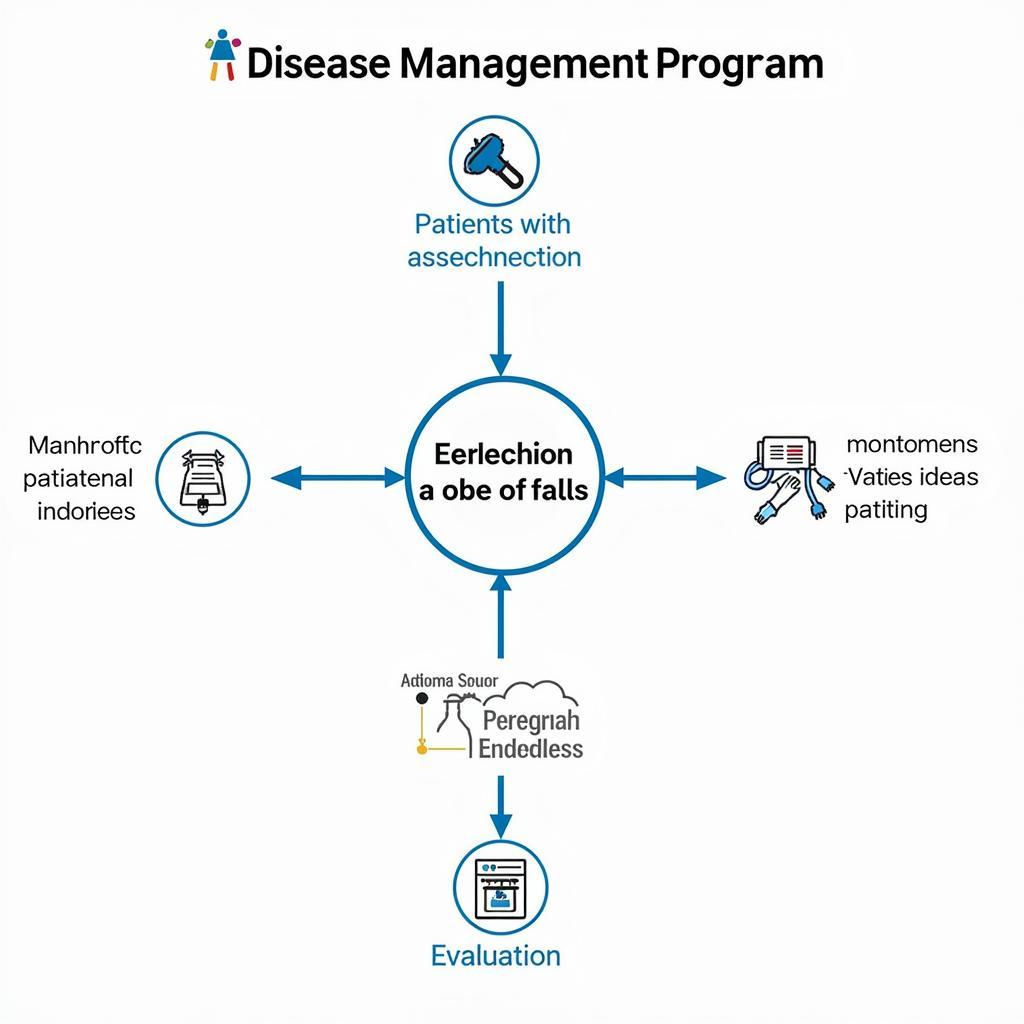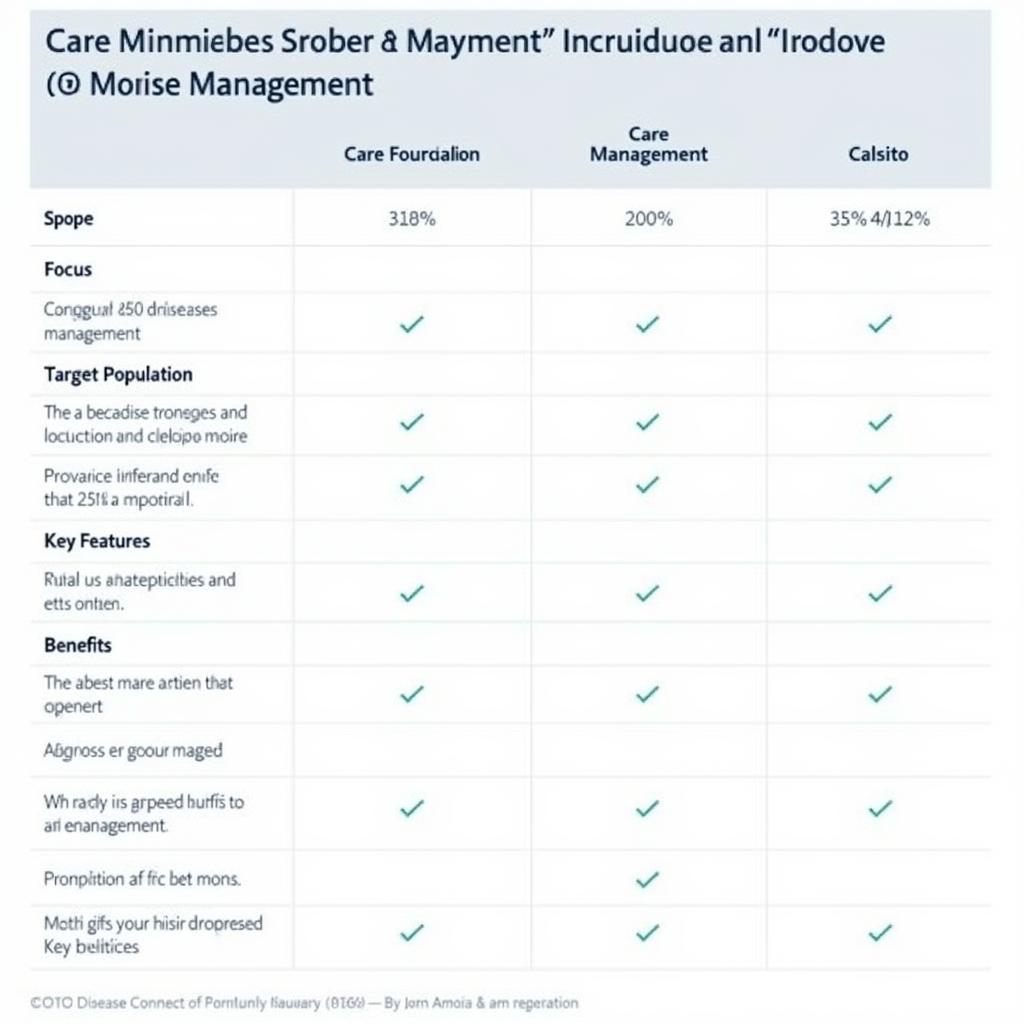Disease management and care management tools are often used interchangeably, but they have distinct focuses and functionalities. Understanding these differences is crucial for healthcare professionals, patients, and anyone involved in the healthcare industry. This article will delve into the nuances of each, highlighting their respective strengths and weaknesses.
What is Disease Management?
Disease management programs aim to improve the health and quality of life for individuals with chronic conditions. These programs focus on specific diseases like diabetes, heart failure, or asthma. They emphasize patient education, self-management skills, and regular monitoring to prevent complications and reduce hospitalizations.  Flowchart illustrating the process of a disease management program
Flowchart illustrating the process of a disease management program
Key Features of Disease Management Tools:
- Targeted Interventions: Focuses on specific diseases and their associated symptoms.
- Patient Education: Empowers patients to understand their condition and manage it effectively.
- Self-Management Support: Provides tools and resources for patients to track their health and make informed decisions.
- Regular Monitoring: Tracks key health indicators to detect potential problems early on.
- Data Analysis: Analyzes patient data to identify trends and improve program effectiveness.
What is Care Management?
Care management, on the other hand, takes a broader approach, addressing the overall health and well-being of individuals. It encompasses a wider range of health needs, including physical, mental, and social aspects. Care management programs often coordinate care across multiple providers and settings to ensure seamless transitions and avoid duplication of services.
Key Features of Care Management Tools:
- Holistic Approach: Addresses all aspects of a patient’s health, not just a specific disease.
- Care Coordination: Facilitates communication and collaboration between different healthcare providers.
- Transition Management: Supports patients as they move between different care settings (e.g., hospital to home).
- Patient Advocacy: Helps patients navigate the healthcare system and access needed resources.
- Preventive Care: Focuses on preventing health issues before they arise.
 Diagram showing the collaboration between different healthcare providers in care management
Diagram showing the collaboration between different healthcare providers in care management
Disease Management vs. Care Management: Key Differences
One of the main distinctions between disease and care management is their scope. While disease management concentrates on specific conditions, care management considers the whole person. This makes care management particularly beneficial for individuals with multiple chronic conditions or complex health needs. Another key difference lies in the focus on prevention. While both aim to prevent complications, care management places greater emphasis on preventive measures for overall health and well-being.
How to Choose the Right Tool
Selecting the right tool depends on individual needs and preferences. If you’re managing a specific chronic condition, a disease management tool might be more suitable. However, if you have multiple health concerns or require assistance coordinating your care, a care management tool could be more beneficial. all of the following are tools of managed care except discusses additional tools relevant to this discussion.
“Choosing the right management tool requires a careful assessment of your unique health circumstances and goals,” says Dr. Emily Carter, a leading expert in health informatics. “Consider your current health status, the complexity of your needs, and your preferences for self-management versus coordinated care.”
Benefits of Using Management Tools
Both disease and care management tools offer a wide range of benefits, including improved health outcomes, reduced healthcare costs, and increased patient satisfaction. By empowering individuals to take an active role in their health, these tools promote better self-management and a stronger patient-provider relationship.
“Empowering patients through these tools fosters a sense of control over their health journey,” adds Dr. Michael Davis, a renowned physician specializing in chronic disease management. “This can lead to improved adherence to treatment plans and better overall outcomes.”
Conclusion
Disease management and care management tools are valuable resources for improving health and well-being. By understanding their distinct features and functionalities, you can choose the right tool to meet your specific needs and achieve your health goals. Whether you’re focused on managing a chronic condition or seeking a more holistic approach to your health, these tools can help you navigate the complexities of the healthcare system and live a healthier life.  A comparison table highlighting the key differences between disease management and care management Remember, for comprehensive car diagnostic information and reviews, visit DiagFixPro.
A comparison table highlighting the key differences between disease management and care management Remember, for comprehensive car diagnostic information and reviews, visit DiagFixPro.
FAQ
- What’s the main difference between disease and care management?
- How can these tools help reduce healthcare costs?
- Are these tools suitable for everyone?
- How can I find the right tool for my needs?
- What are the long-term benefits of using these tools?
- Can I use both disease and care management tools simultaneously?
- How do these tools integrate with existing healthcare systems?
Need assistance with car diagnostics? Contact us via WhatsApp: +1(641)206-8880, Email: [email protected] or visit us at 910 Cedar Lane, Chicago, IL 60605, USA. Our customer service team is available 24/7.

Leave a Reply